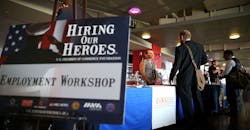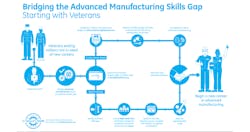If you can show proof you're a veteran today, you can get free red, white and blue pancakes at IHOP or take advantage of the BOGO burrito or taco deal at Chipotle. In fact you could get a whole bunch of freebies around town.
These corporate brands mean well, I'm sure. But when you're trained to work for everything you've got -- every minute of every day for about four or more years , it feels a bit weird to cash in on all that by accepting a piece of pie or free haircut.
That's how I feel about it anyway.
My enlistment in the United States Navy ended in 2002 and I've never taken any of these chains up on their offer, but that probably had more to do with feeling guilty that I wasn't still active duty.
Those still serving deserve free stuff, partly for putting their lives on the line, but mostly because of the criminally low pay. Many of my old submarine crew are still huffing recycled air and eating boiled potatoes from cans (which we called snake eggs), while I get such amenities as sunlight and privacy? And to think of the vets who actually lost limbs in service? Who the hell do I think I am?
To be clear, if I knew of a place giving away free whiskey, you can bet this sailor will check his modesty at the door. And I would never begrudge another vet taking the day and getting as much as they can, because a lot are in need and struggling. But I think a lot of veterans think like me. They didn't earn it, so they don't deserve it.
From Hero to Zero (Respect)
This isn’t a new phenomenon. After World War II, the government offered unemployed vets $20 a week for 52 weeks through the GI Bill. Adjusted for inflation, that's $247.62/week, or less than $1,000/month.
But still, people at the time, including General Omar Bradley, head of the Veteran's Administration, were worried of abuse, that they would all join the 52-20 Club, meaning they would use the full year of "free" checks.. Several periodicals, from Colliers to Saturday Evening Post espoused fear that vets were going "soft" and turning into "bums."
Imagine taking Iwo Jima or storming Normandy, doing no less than saving the world from tyranny, and being accused of gaming the system because it took you a few months to acclimate to a life where bullets were not whizzing by your head as you watch your best friend bleed out.
But as much as the WWII vets deserved this entitlement, and more, less than 20% of the unemployment benefits were claimed, according to the VA. And only one in 19 vets used the whole year of pay, less than $13,000 in today's money.
So these heroes had an out, which many didn't use. Instead they often took whatever job offered to them.
Here's an excerpt from Soldier Returning from War, by Thomas Childers:
"Sometimes, when I'm looking through the paper," one bitter veteran said, "I turn past the sports page to the want-ad section, thinking maybe I'll find something better than what I've got. I probably will someday. I keep wondering and thinking what else I might be doing if I hadn't been in the damn war for four years."
The huge problem vets had, besides the undiagnosed Post Traumatic Stress Disorder, was that their skills didn't neatly translate to civilian jobs. Here's how the job interviews with some 4-F manager probably went: "So I see here you drove a tank at the Battle of the Bulge? Well, we don't have tanks here at Save-Mart, but how about we have you push the shopping carts in from the parking lot?"
Discouraging doesn't even describe how that feels. I got out in January, and had to wait until the fall to start college. So I had to find a job in the interim.
Swallowing Pride, Eating Crap
I was 22 and had traveled the world, been under the Arctic ice and as sonar tech was responsible for the safe navigation of a $1 billion submarine, and the preventative maintenance of all the sonar gear, of which there was much.
You think Lock Out/Tag Out is a pain? Every time we ported, I had to fill out more than 70 "danger tags" to shut off external components, which needed to be signed and verified by two superior officers and hanged every time we went into port. If I screwed up, a diver could die. I guarded this sub as an armed sentry for hours at a time, including on September 11, when I spent the lonely first four hours of Sep. 12 in the lookout, vigilantly waiting for a terrorist to try and come aboard so I could blast them in the face. I also cleaned bilge tanks a lot, which is less impressive, but no less important.
A lot of my job was classified, and even the non-classified stuff seemed too esoteric for a human resources lackey to understand. So I got denied every job I applied for, and my terminal leave, the 30 days of saved vacation I squirreled away, was about to run out. I could have gone on unemployment, in hindsight, but I was more proud than practical back then. Instead, I accepted the only place that called me back: Old Navy.
So I went from the real Navy to one known for fleeces and cargo shorts. We all gotta' be the butt of a cosmic joke sometime, I thought. Everything about the job was horrible, as you can imagine, but I gave it my all. Because that's what I was trained to do.
I'm not special in that way. I was just trained the same as any other soldier or sailor.
Close the Skill Gap
So what does any of this have to do with you?
As of 2015, there were 3.6 million veterans who served since Sep. 2001, half between the ages of 25 and 34, according to the Bureau of Labor Statistics. They had about a 4.5% unemployment rate, so there's at least 162,000 that could use a good job. And if President-elect Donald Trump keeps his campaign promise, there will be 25 million new jobs created, many in the manufacturing sector.
Yes, many manufacturing jobs will be automated in the future, but soldiers and sailors had access to your cutting edge tech ten years ago, so if anyone can quickly learn how to operate those robots, it's them.
Accelerated learning is just one of the intangibles the Manufacturing Institute lists says vets possess. Others include teamwork, leadership, and working well under pressure.
You're probably looking for workers with these skills in your plant, so if you have any part in hiring, make sure you look into the Get Skills to Work Initiative. It's a way for manufacturers to close the skills gapo while providing veterans a good-paying job where they will feel valued and defend America in the new war for economic superiority. The coalition was started by General Electric and has helped place 79,895 vets in jobs since 2012.
So while many American companies celebrate today by offering freebies to vets, we ask that that you spend some time at FastTrackfrorHeroes.org, or RecruitMilitary.com, to see how your plant can offer a vet what he or she really needs: a place where they can work hard, feel appreciated and make a difference.
About the Author
John Hitch
Editor, Fleet Maintenance
John Hitch, based out of Cleveland, Ohio, is the editor of Fleet Maintenance, a B2B magazine that addresses the service needs for all commercial vehicle makes and models (Classes 1-8), ranging from shop management strategies to the latest tools to enhance uptime.
He previously wrote about equipment and fleet operations and management for FleetOwner, and prior to that, manufacturing and advanced technology for IndustryWeek and New Equipment Digest. He is an award-winning journalist and former sonar technician aboard a nuclear-powered submarine where he served honorably aboard the fast-attack submarine USS Oklahoma City (SSN-723).



